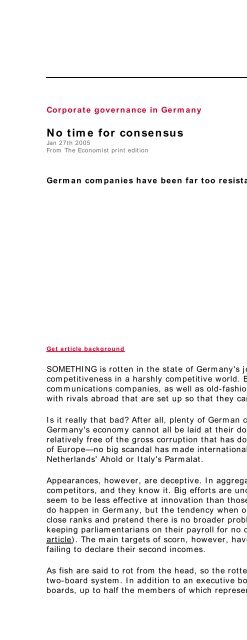The Economist - January 29th, 2005
The Economist - January 29th, 2005
The Economist - January 29th, 2005
Create successful ePaper yourself
Turn your PDF publications into a flip-book with our unique Google optimized e-Paper software.
Corporate governance in Germany<br />
No time for consensus<br />
Jan 27th <strong>2005</strong><br />
From <strong>The</strong> <strong>Economist</strong> print edition<br />
German companies have been far too resistant to change<br />
Get article background<br />
SOMETHING is rotten in the state of Germany's joint-stock companies, and it is robbing them of<br />
competitiveness in a harshly competitive world. Banks, carmakers, engineering and<br />
communications companies, as well as old-fashioned conglomerates, all have struggled to keep up<br />
with rivals abroad that are set up so that they can make quicker decisions.<br />
Is it really that bad? After all, plenty of German companies do just fine, and the problems of<br />
Germany's economy cannot all be laid at their door. Moreover, the corporate sector there seems<br />
relatively free of the gross corruption that has dogged its equivalents in America and other parts<br />
of Europe—no big scandal has made international headlines to rival America's Enron, the<br />
Netherlands' Ahold or Italy's Parmalat.<br />
Appearances, however, are deceptive. In aggregate, Germany's companies are falling behind their<br />
competitors, and they know it. Big efforts are under way to try to understand why companies<br />
seem to be less effective at innovation than those in, say, Britain or America. As for scandals, they<br />
do happen in Germany, but the tendency when one company is embarrassed is for the others to<br />
close ranks and pretend there is no broader problem. <strong>The</strong> latest brouhaha concerns companies<br />
keeping parliamentarians on their payroll for no obvious reason but to gain political favour (see<br />
article). <strong>The</strong> main targets of scorn, however, have been not the companies, but the politicians, for<br />
failing to declare their second incomes.<br />
As fish are said to rot from the head, so the rottenness of German companies starts with their<br />
two-board system. In addition to an executive board of directors, they all have supervisory<br />
boards, up to half the members of which represent the workforce rather than shareholders. Too



